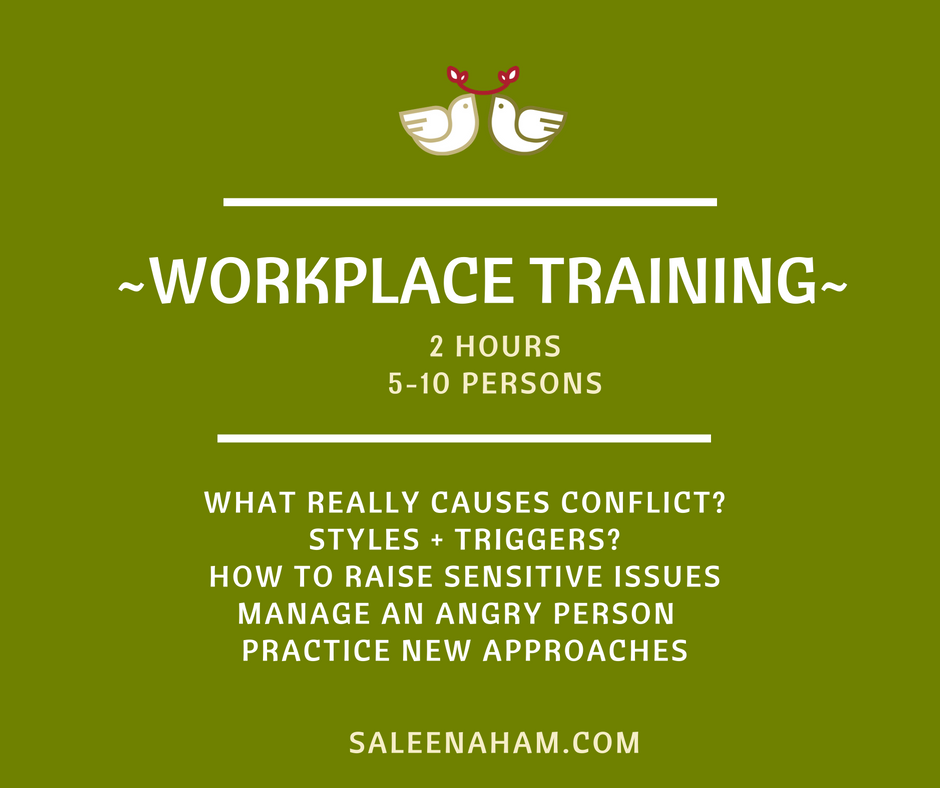Do you know how to deal with an angry person? Do you know how to cope when Someone starts yelling or expressing serious unhappiness with you as their focus? It is not nice. It makes us feel unsafe – if not necessarily physically – certainly emotionally, psychologically. Our bodies tense, our feelings rise or shut down. We all have habits in the way we deal with conflict and being aware of these is an important first step in a new way to resolve conflict. Too often we do things on autopilot that escalate a situation or don’t deal with it. We drop into an automatic pattern of attack/defend or we go silent and endure.
Managing conflict is something that is programmed into us early. As children, we learned the ways that our family unit ‘did’ disagreement. Some families are loud and direct with each other, no fear. Some require peace and quiet AT ANY PRICE. Some hold onto meanness with silent treatment and side pain. Some have a culture of apology. Some are all about who won, who was “strongest”. These particular lessons mark us deeply. As children we develop strategies and patterns to stay safe when tension happens. These become an unconscious set of habits or responses – often we are not even aware that certain buttons are being pushed — and we then trot out the programmed response.
Do you have That Same Argument – you know the one – with the same person, regularly? Whatever conversation comes up, you end up Back There in an unhappy exchange? It’s possible that is a pattern being driven by things from long ago – and not really about any content you are apparently discussing today. You both have particular buttons that get pushed so that you just fall into the same old conversation ruts. There are some ways of breaking that argument mould. Try a new thing, if you are willing.
Be Self Aware. When a person is attacking you verbally, the the best thing you can do is listen. Be alert to the need to yell back and resist it! Don’t say “Calm down” – it is disrespectful. Don’t retaliate. Don’t think that this is about you – it’s not about you – it is about an Issue. Or a Problem. Or a Situation. It may even be a Misunderstanding. You don’t need to take it personally or justify or defend.
Listen. Really properly listening will take the heat from a very upset person. Give them eye contact and your full attention. Nod. Be engaged with their concern. Repeat back a neutral summary of what you understand they said.
Name their emotions. Every time you name an emotion the other person is feeling, you will reduce its intensity for that other person. They will start to calm down because they don’t have to yell to have their feelings and concerns recognised as legitimate. Once the emotion is lowered, it allows space for thinking rationally and in a more balanced and insightful way about what is the problem or issue.
Understand the content. Summarise to them the key issues that you believe you heard. This let’s them know you heard what they said. Recognise their perspective – listening to someone does not signify your agreement with them; just your understanding of what they are thinking, of what is their position.
Explore their problem. Look for what is behind the surface issues. What needs, motives or fears are behind the presenting facts? Find out what is at the heart of the problem, what needs are not being met here. Look for the tangible and the intangible factors.
State your views. Keep the focus on the problem, not the person. State your feelings on the matter., by all means and if this creates an emotional response, kick back into your true listening mode.
Look for possible solutions. What do they want? Often people can easily tell you what they do not want – but what they DO want is not easily named at first. Work with the problem. Work with the cause of the problem, the underlying source. Work together on pros and cons. Find some agreement on either a next step or a trial solution.
Conflict is a creative opportunity if we can be self aware, in all of the messiness of being human, to stop the escalation cycle and listen before responding.
Saleena Ham









